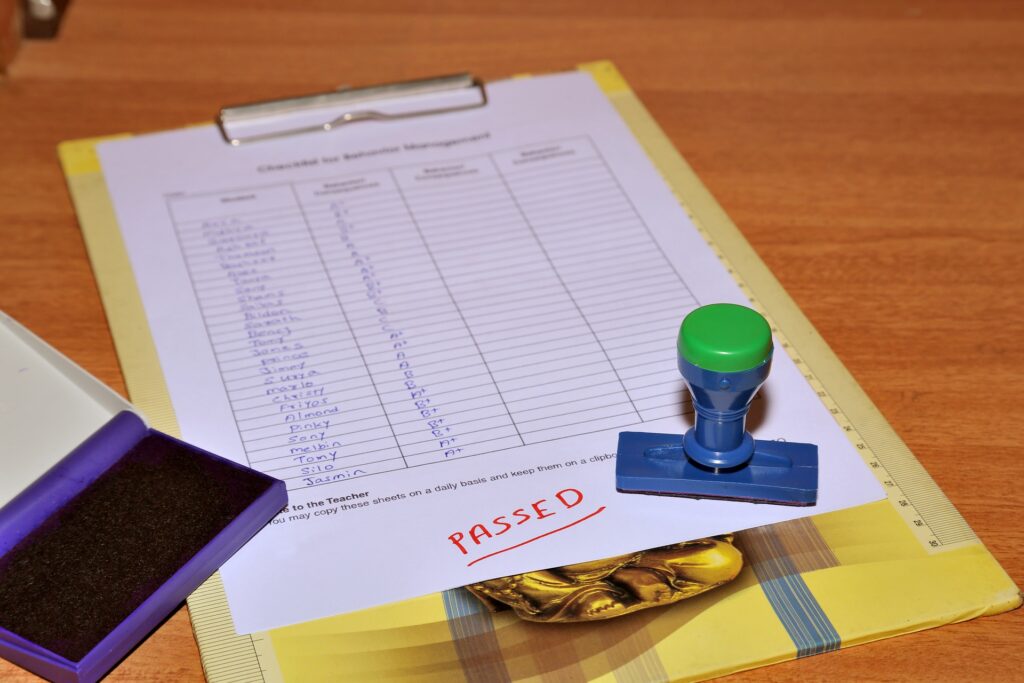If you’ve decided the next step in your career is an MBA, the only thing standing in your way is a plan for how to pass the GMAT. Your GMAT score impacts whether you can get into your first-choice business schools.
Unlike other tests, there is no “passing” grade. You’ll just need to set your own score goals and commit yourself to a rigorous course of study.
This article will discuss how to pass the GMAT with the competitive scores you need. Get techniques to prepare for the test, insider tips, and insight into finding the best GMAT prep course to help you achieve your goals.
How to Determine Your “Pass” Score

Before tackling how to pass the GMAT, let’s talk about setting a target score. Some candidates forget that it’s on them to set a specific, measurable target. Setting a goal helps you set aside the right amount of time for study and practice, and cross the finish line strong.
A target score:
- Provides you with an aspirational goal
- Helps you choose a GMAT study program (some are tailored to people who want a high score)
- Frames your study process and plan
- Helps gauge success or failure on practice tests
Your target will serve as a lens to focus the rest of your study. Before diving into the numbers, here is a brief reminder of how the GMAT is scored.
There are five components to GMAT scoring:
- Analytical Writing: An essay scored from zero to six
- Integrated Reasoning: 12 questions with a total score from one to eight
- Quantitative: 31 questions with a total score from six to 51
- Verbal: 36 questions with a total score from six to 51
- Total Score: Combined Quantitative and Verbal scores, adjusted by difficulty into a 200-800 point scale
On your GMAT Score Report, the Total Score includes only the two computer-adaptive sections of the GMAT. Quant and Verbal questions are not all scored equally. Your score will be calculated based on the difficulty of each individual question you answered.
The questions you are given will get harder or easier, based on your answers as you go through the test. Answering more difficult questions will result in higher scores. There are also deductions for not completing all the questions, so timing is important.
It seems logical to focus on your “total” score and neglect the analytical writing and integrated reasoning portions of the test, but that’s a trap you should avoid. The programs you apply to are looking at those scores as well.
While some courses focus on the math-heavy Quant section, it’s worthwhile to invest in a comprehensive program like Magoosh GMAT to cover all the sections.
Calculating Your Pass Score
To settle on a goal, figure out what MBA programs you want to get into. This shortlist will go a long way in shaping your studies.
As you research your programs, each will show information on accepted students’ average GMAT scores. Compile data from several years to get a more complete picture of the score your programs accept.
Now, take the highest average in the entire group and add at least 20 points to establish your goal.
Why add a cushion?
That bump gives you an aspirational goal, helps you work above the program minimum and covers the GMAT score’s upward trends.
As you can guess, establishing the target is the simple part. Now comes the hard work.
How to Pass the GMAT: Study Guide

A good GMAT study program will provide comprehensive materials, including lectures, recorded videos, GMAT prep books and study questions. Calendaring out your plan is essential.
Most candidates spend two to three months studying for the GMAT, but some end up speeding through a 1-month study plan. It’s best practice to reverse engineer your GMAT study plan from your intended test date.
Here are some GMAT tips and important factors to include in your study plan.
Don’t Start Preparing Without a Plan
To succeed at the GMAT, you need a plan. At a minimum, the plan should:
- Be tailored to your goal score
- Align with your time frame
- Take your strengths and weakness into account
A good GMAT prep course is the best way to stay on track. You may find accountability within a live course, with a GMAT tutor, or alongside a cohort of fellow candidates.
Identify Your Weaknesses
Once you have a schedule, the first step is to find your weaknesses. Your weaknesses will chart a path for prioritized study.
Start with a GMAT practice test and analyze the results. Some GMAT test prep programs will provide these as an entry point. You can take GMAT proctored tests and authentic GMAT tests that will best resemble the exam itself.
Once you have the data (your score), look for trends. Figure out the types of problems you missed and what skills you need to solve them. Those are the areas to focus on as you study for the GMAT.
For Mathematics, Start With Fundamentals
Before you dive into anything complex, start with the easy math. Practice solving problems quickly, accurately, and without a calculator.
You won’t have your phone with you on the day of the GMAT. You’ll be provided a calculator for the Integrated Reasoning section, but not the Quant. For the Quantitative section you will only have access to pen and paper. Some GMAT prep courses exclusively cover Quant and may be worth looking into. Even if it doesn’t come naturally to you, it’s possible to develop the math skills needed to do well on the Quant section.
Add Reading to Your Daily Routine
The verbal section of the GMAT includes critical reasoning, reading comprehension, and sentence correction questions. You will need to make complex assessments on a variety of texts. Scheduling time for daily reading from a range of sources is the best way to prepare.
To make it engaging, read subjects you find interesting, but vary the format. Whether it’s fiction, non-fiction, journals, or blogs, approach your reading with the same critical eye you will use on the test.
The Economist GMAT Tutor courses include a digital subscription to the magazine, which is great material for this practice.
Take Timed Practice Tests Early and Often
Practice tests will illustrate your progress and familiarize you with GMAT test-taking. Take practice tests as often as you can.
Spend time and make your practice tests as authentic as possible. Use the same schedule and guidelines as the actual test.
If your in-home testing doesn’t feel enough like the real thing, Kaplan’s GMAT prep includes a Test Day Experience, where you can go to a test facility and take a practice test under GMAT conditions.
There Is No Quick Fix
Above all, remember that there’s no immediate fix or magic wand to get a great GMAT score. First time high scores or GMAT score improvements come from hours of consistent study over the course of several weeks.
The silver lining is, if you are willing to put in the time, you can meet your goals.
How to Pass the GMAT: Exam Day Tips

You’ve prepared for months. You’ve followed your plans and improved on practice tests. Now, it’s time for the real thing. Here are expert tips to put all of your hard work into action on GMAT exam day.
Have a Pre-Test Plan
Have the morning of the test planned out to the letter. Unexpected disruptions will come up. A well-designed and executed plan will minimize stress and its impact on your test performance.
An example schedule should include your wake up time, the meals you have planned, what you will bring and—if you are taking the exam on-site—how early you plan to leave for the test center.
The test is typically administered at a Pearson VUE test center but until the end of 2020, the GMAT is also available online. Your pre-test plan may change with the online test, but it is just as important to stick to your routine.
Get Ample Sleep Before the Exam
After all of the preparation you’ve done, nothing will hurt you more than going into the exam sleep deprived. Even in the week leading up to the test, make sleep a priority.
Pay close attention to how your test schedule and location will impact your sleep. For in-person tests, you have options for a morning or an evening test. If waking up early is difficult and you opt for a morning test, practice waking up on time.
Online tests will offer a much wider range of test appointments. Plan your online test around your sleep schedule, and make it a serious part of your preparation.
Don’t Cram on Test Day
On test-day, the most important factor is mindset. You’ve prepared for this, and you just need to put your knowledge onto the page.
Practice mental calm and stress-relieving tactics. This may include deep breaths, visualization, a very light review of something, or simply following your test day plan. Don’t worry about packing in more information right before the test.
Solve Warm-Up Problems
While cramming isn’t recommended, it may be helpful for some people to “warm up” by solving simple problems right before the test. The goal is to get yourself in the test-taking mindset before the test begins.
Your time on the GMAT is valuable, and this exercise can save you precious minutes when the test starts.
Pace Yourself
On the GMAT, the penalty for not answering is higher than the penalty for answering incorrectly. To avoid running out of time, set yourself a time limit per question, and stick to it during practice exams. Divided evenly, the time you have for each question is:
- Integrated – two minutes and 30 seconds
- Quantitative – two minutes
- Verbal – one minute and 45 seconds
You won’t have a timer with you during the test, so use practice tests to get the rhythm down.
Don’t Sweat Hard Questions
The GMAT is adaptive. The better you do, the harder the questions become. You will run into problems that you cannot answer. That could be a sign that you’re being given more difficult questions.
Even if the first question is one you cannot answer, stick to your pacing, make an educated guess and move to the next. Don’t spend time thinking about questions after you’ve moved on. With only a couple of minutes per question, you can’t waste precious time hesitating or not being entirely focused on the task at hand.
Use Your Breaks Wisely
The total test-taking time for the GMAT is 187 minutes. That is over three hours of rigorous mental activity.
You have two, optional eight-minute breaks you can use between sections. Most experts recommend that you use them.
Find techniques that help you maintain or regain your focus. Walking, stretching and a drink of cold water are common tactics, but find what focuses you.
FAQs

Here are a few answers to frequently asked questions on how to pass the GMAT.
How Long Should I Study For the GMAT?
There are a few factors that impact this question, which is nuanced by your personality and prior knowledge. The most important factors are how long you have to prepare, what programs you’re applying to and where your skills are already.
Many successful business school candidates begin preparations three to six months before the test. We recommend allotting at least three months and 100 hours of prep time.
How Hard is the GMAT?
While it’s not a pass/fail test, it’s notoriously hard to get a competitive score on the GMAT. How hard depends on your goal score and your starting point.
According to the Graduate Management Admission Council (GMAC) the average GMAT score in 2019 was about 565 points. The top 10 business schools will be looking for scores in the 700-760, or the 88th to 98th percentile. The 88th percentile means that only the top 12 percent of test-takers achieve this high of a score.
If you are an average student aspiring towards a high-caliber business school, the GMAT will be challenging, but not impossible.
Can I Retake the GMAT?
Yes. You can take the GMAT a total of eight times. You can retake it up to five times in a rolling 12-month period.
However, don’t just retake it to see if you can do better. Before you schedule a re-test, have a specific score goal, and follow a new study plan to ensure improvement.
Will Schools See All of my GMAT Attempts?
Not necessarily. Once you’ve completed the test, you’ll have the option to record or cancel your score. If you don’t do as well as you hoped, a canceled score will not be submitted to schools.
If you’re unsure at the test facility, you will have up to 72 hours to cancel. If you opt to cancel it, only you will see it on your record, but it will still count towards the overall limit as an attempt.
Which GMAT Prep Course Should I Use?
There is no one-size-fits-all GMAT test prep course. Each fits a unique niche and one may appeal to you more than others. All good GMAT study programs should include video courses, text-based materials, practice tests, and real practice questions. You may also want to buy a GMAT review course that has tutors. This one-on-one, focused attention may be just the ticket to identifying weaknesses and providing the accountability you need to pass the GMAT.
